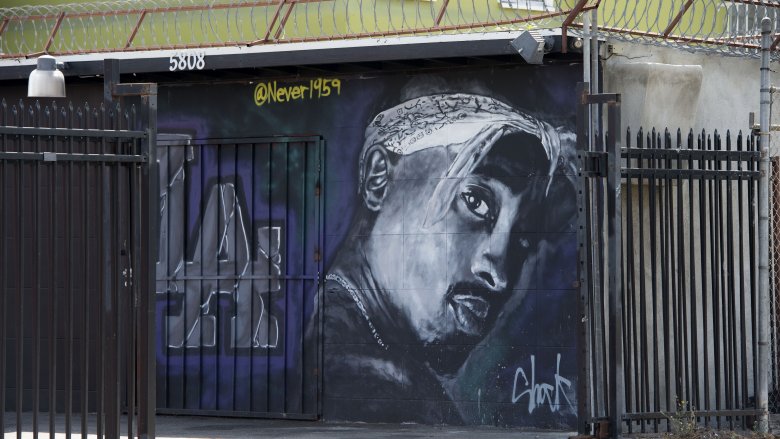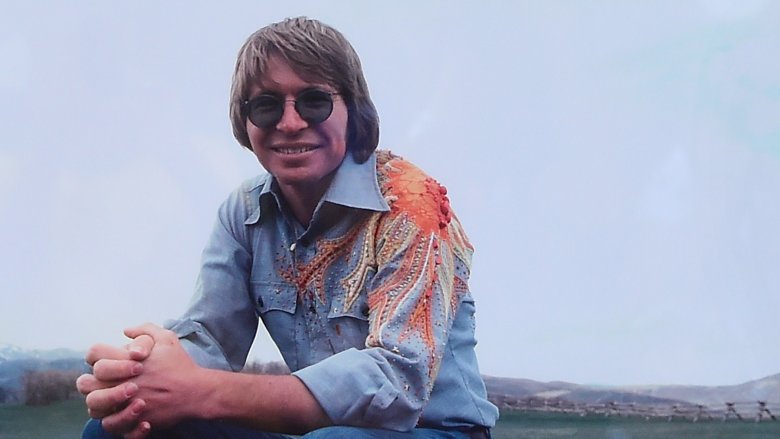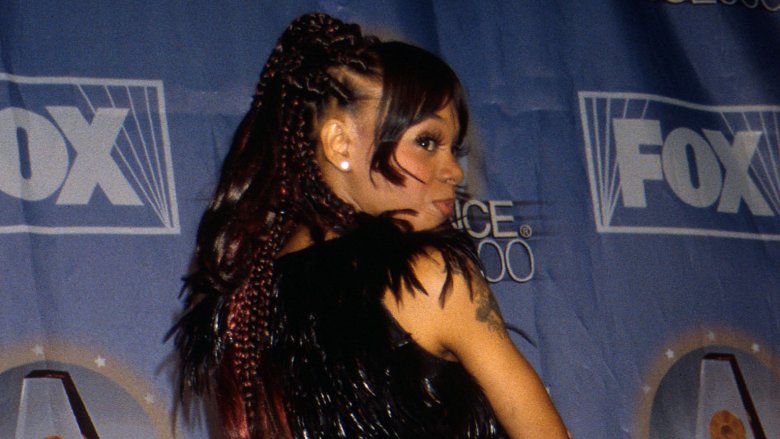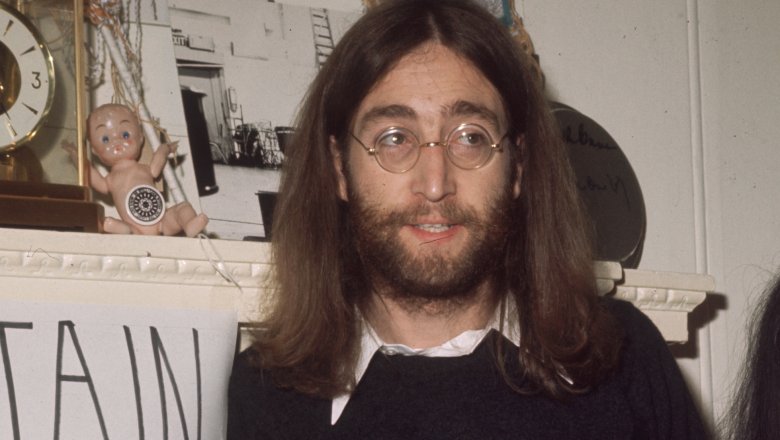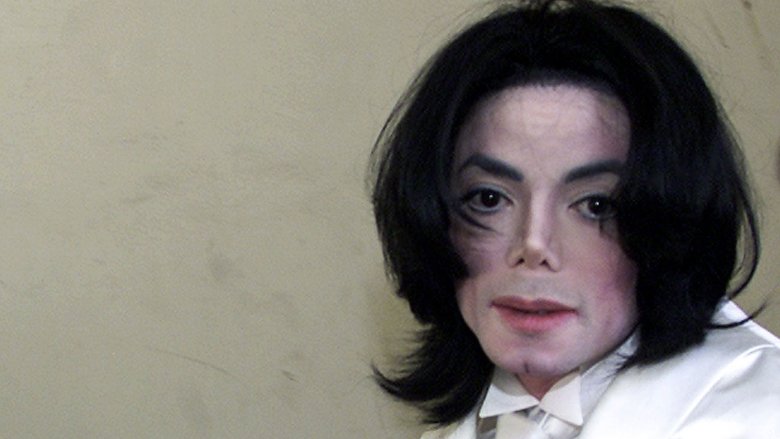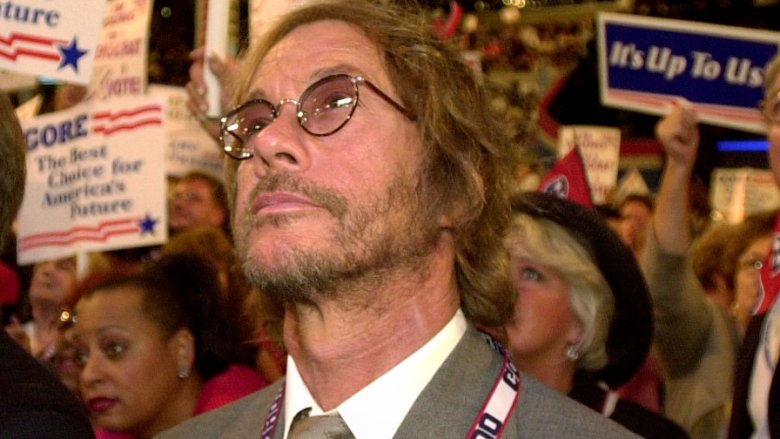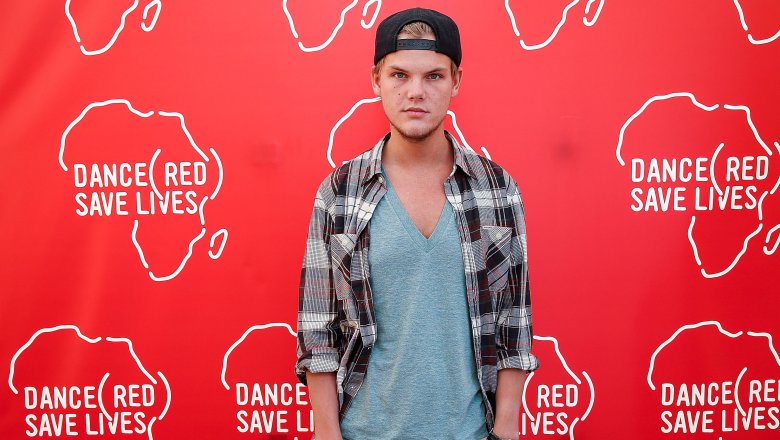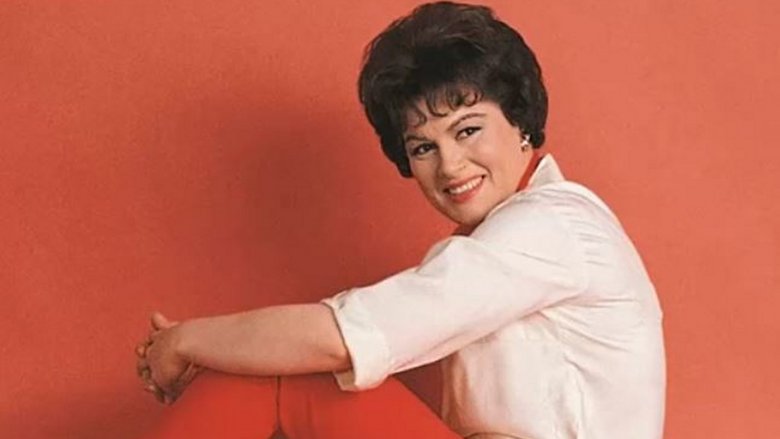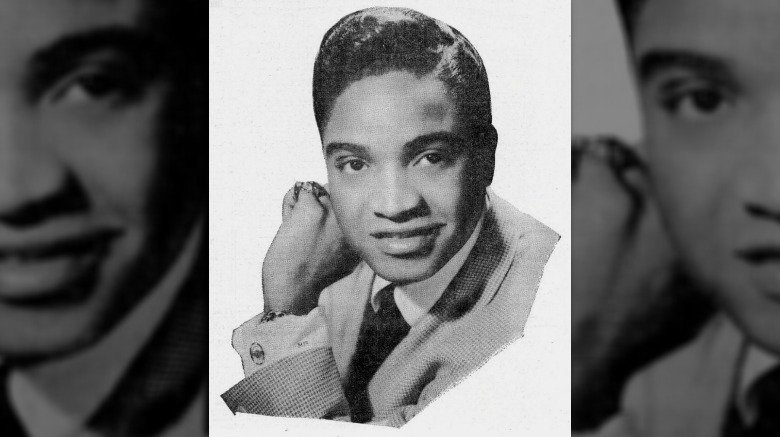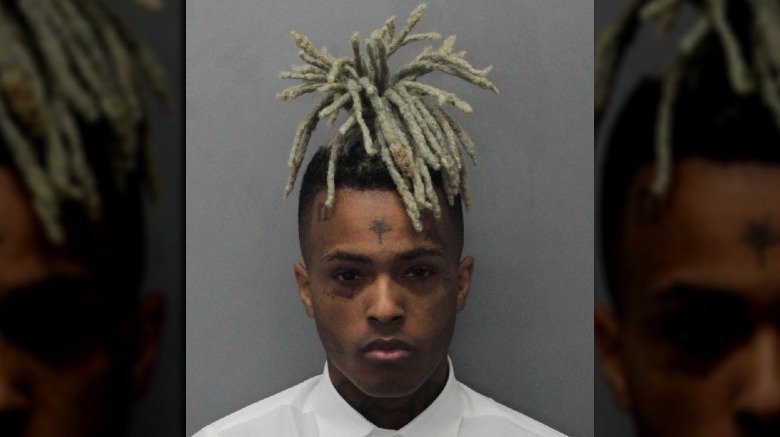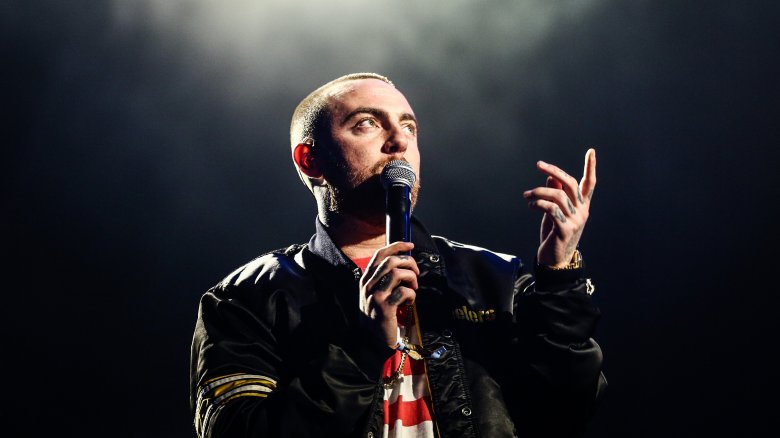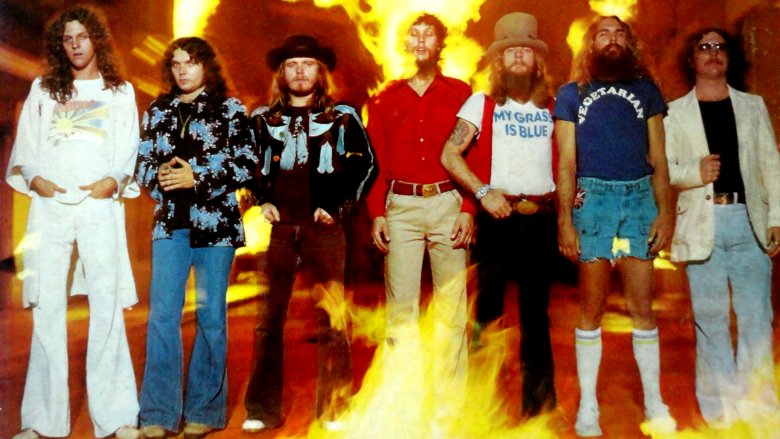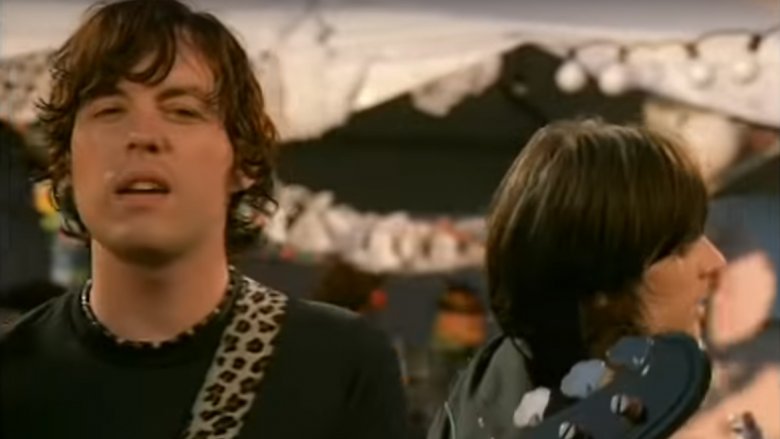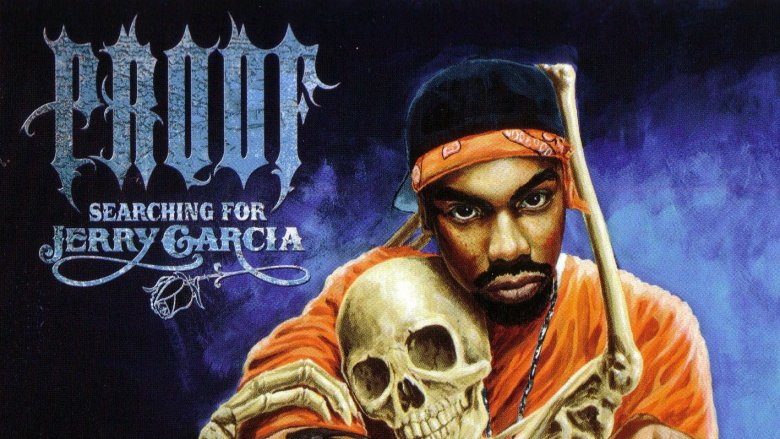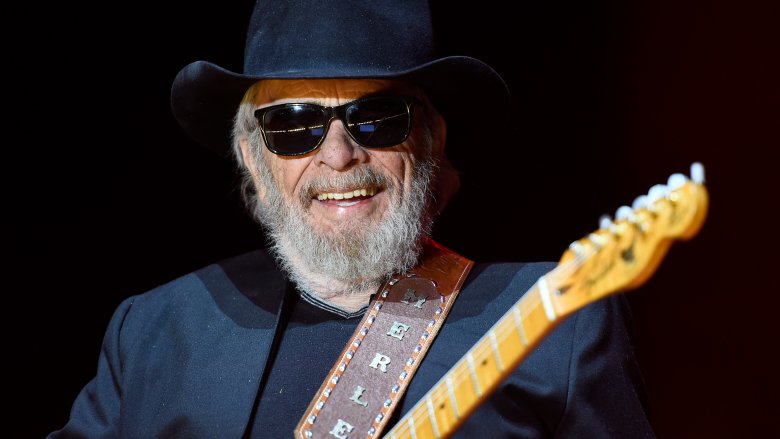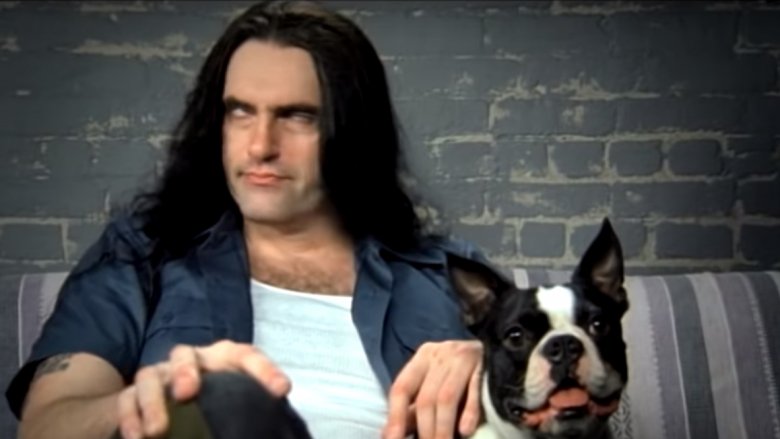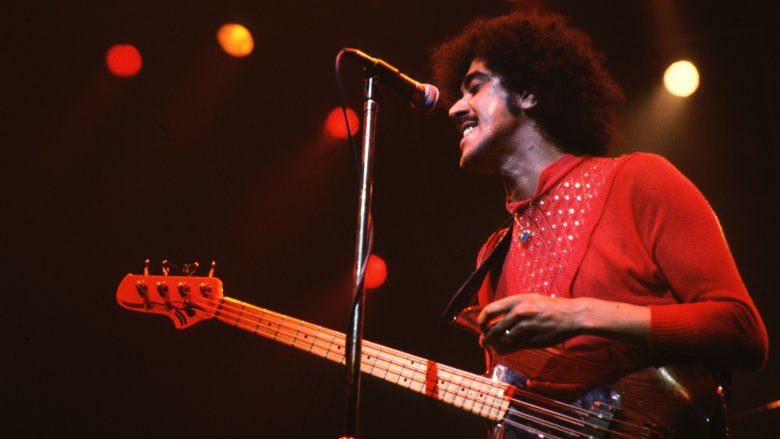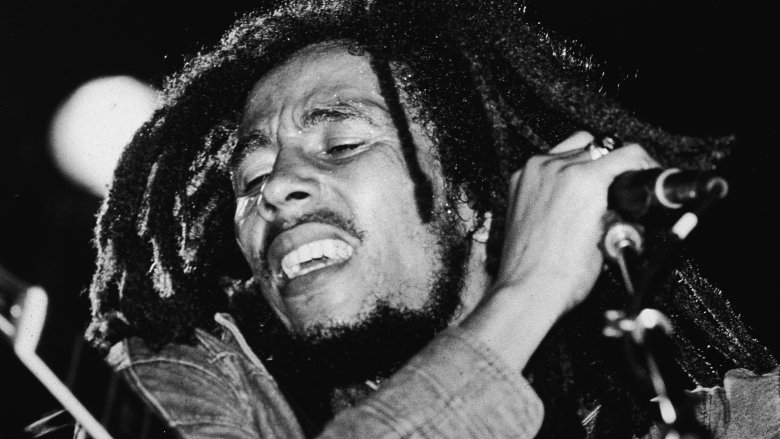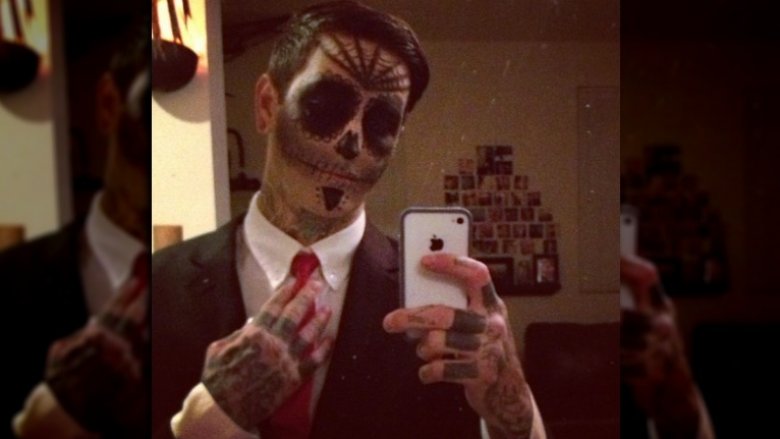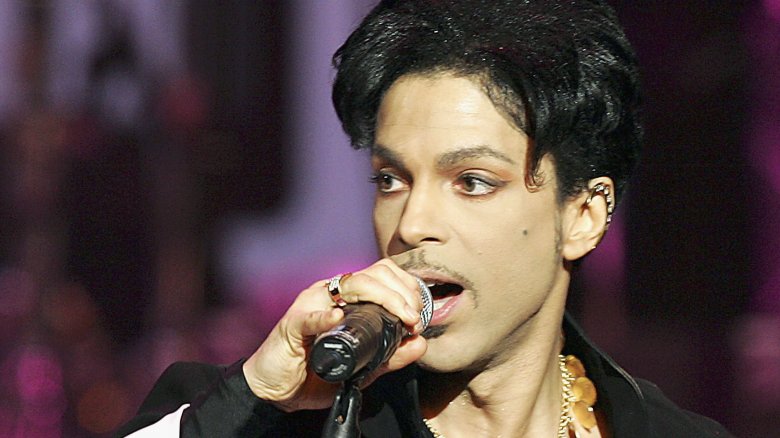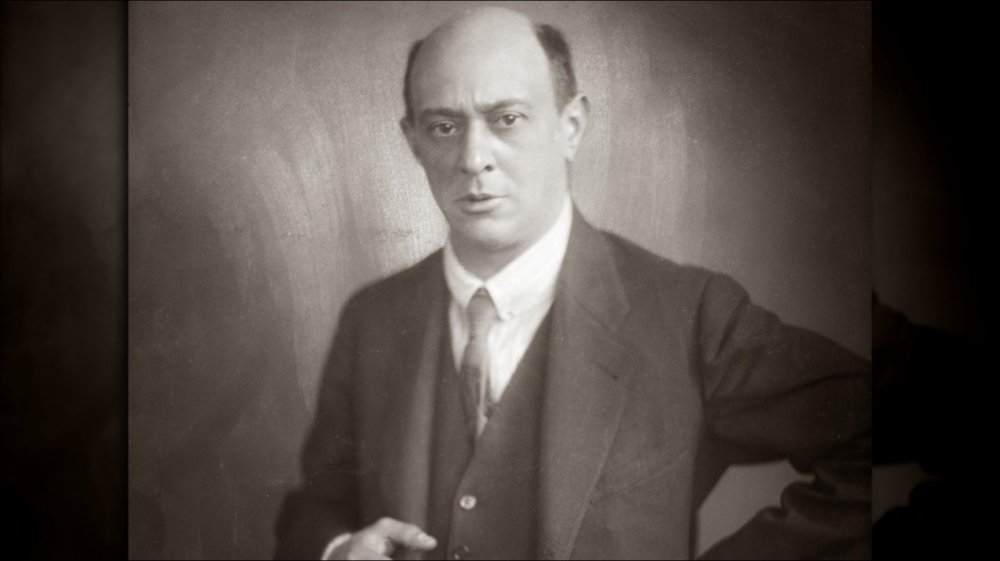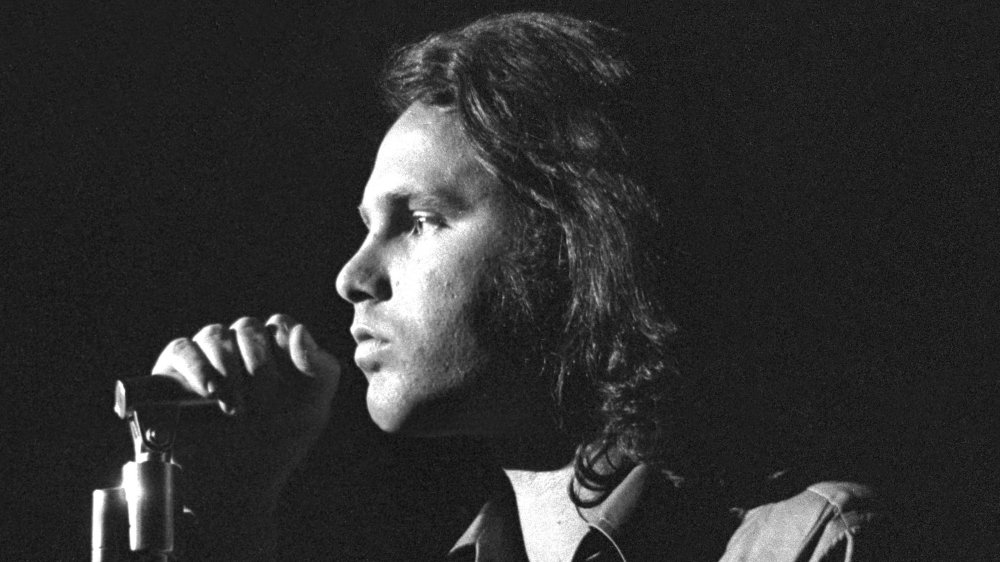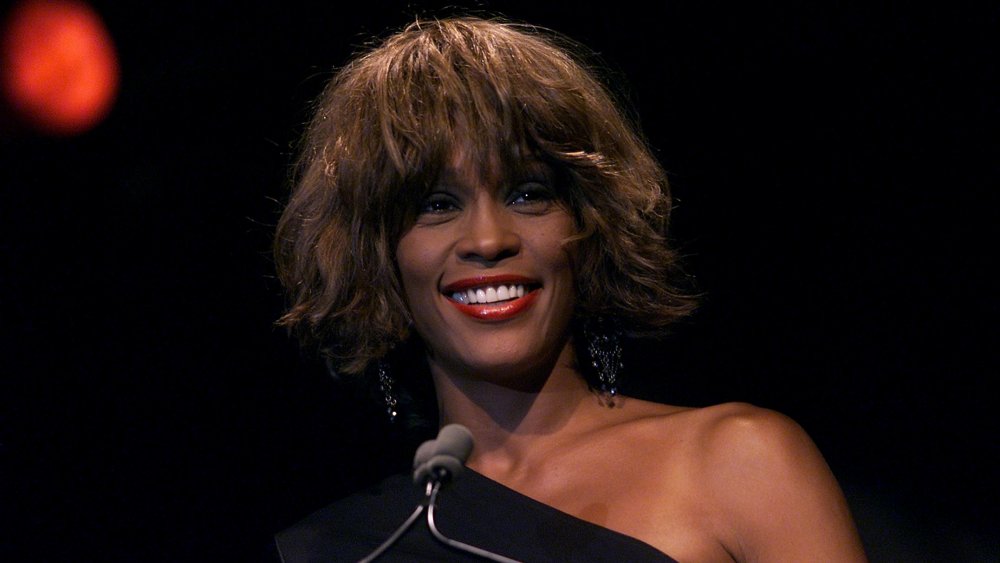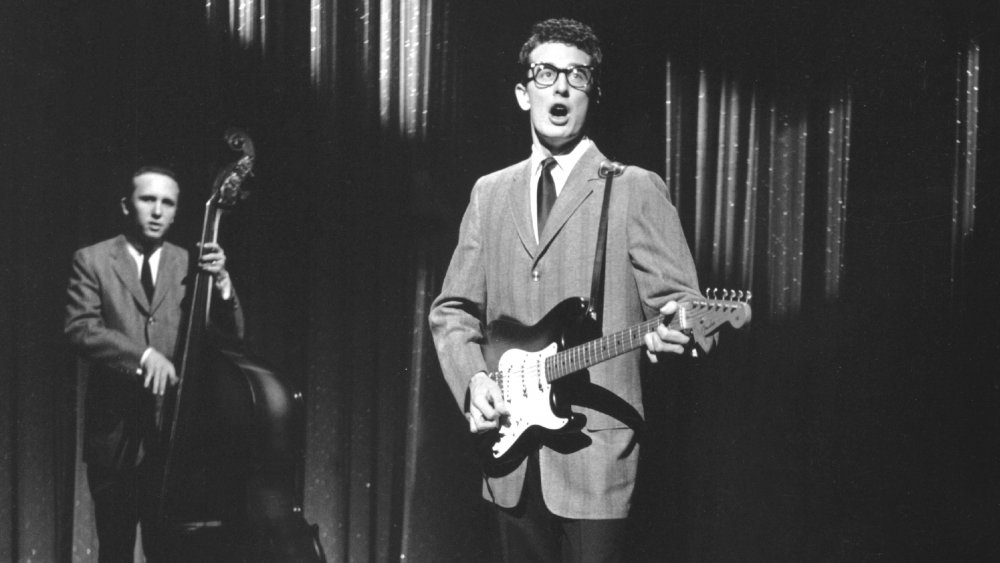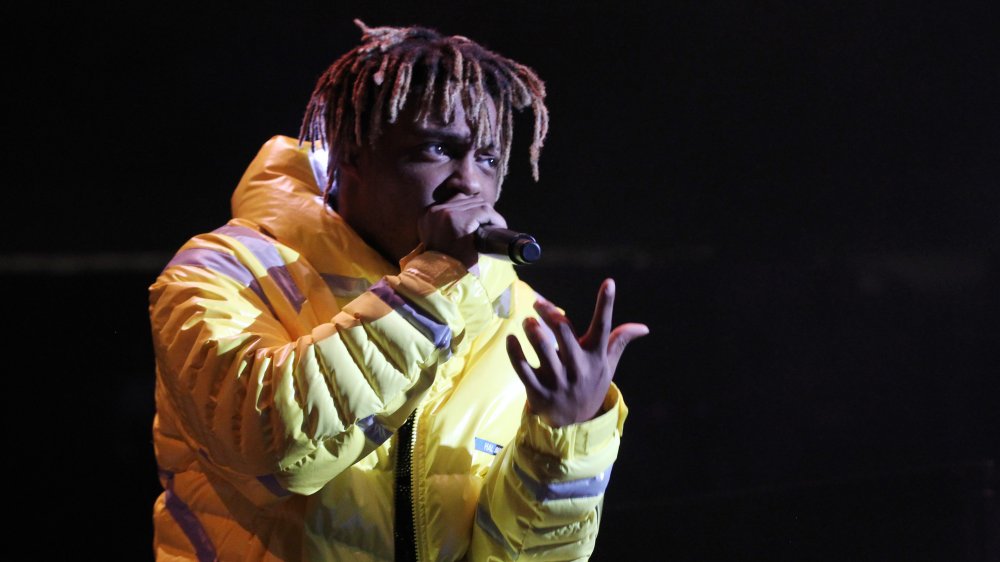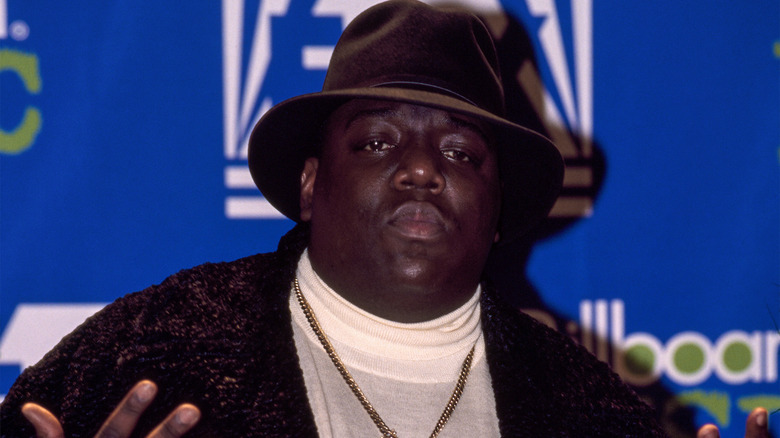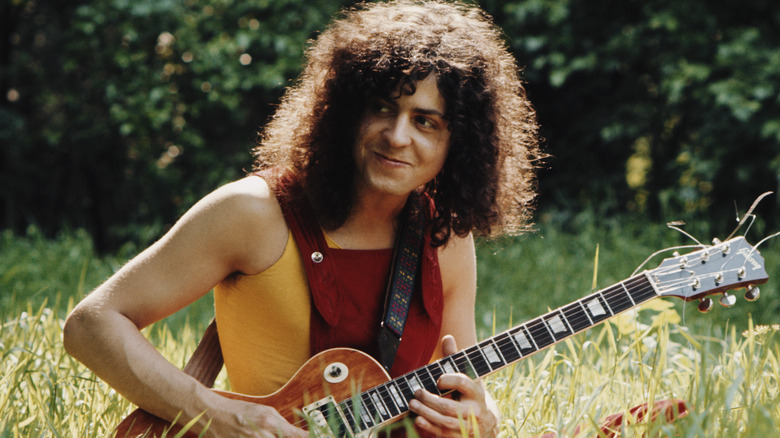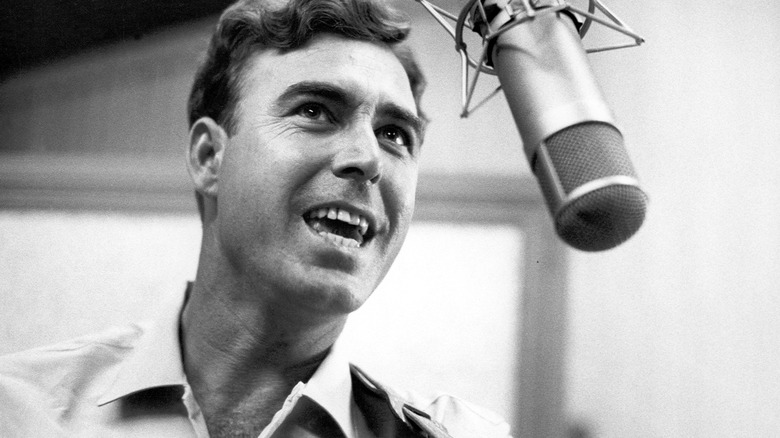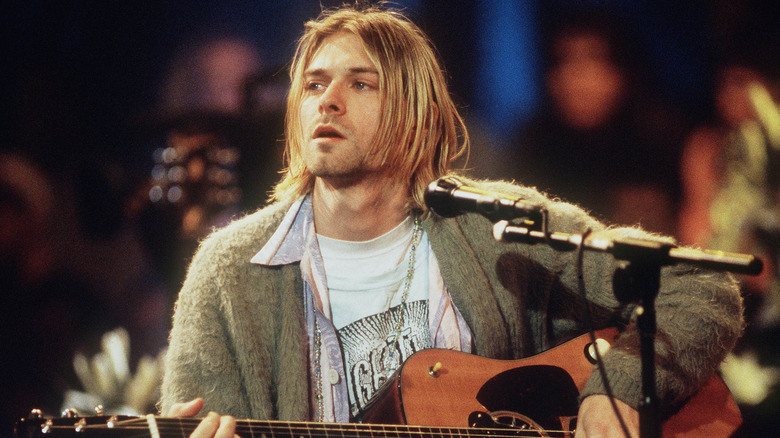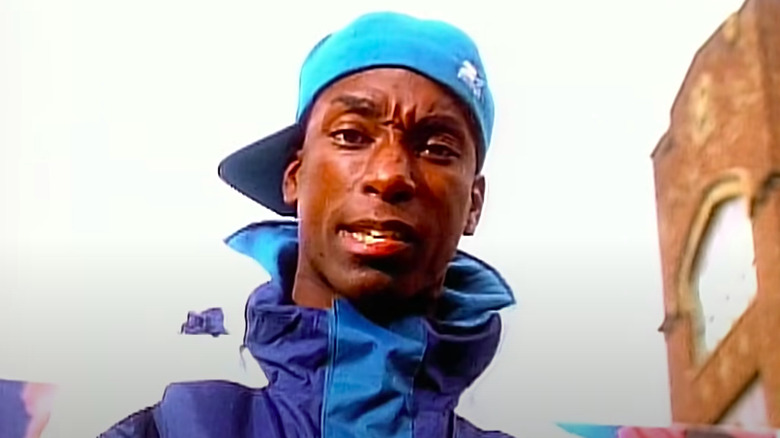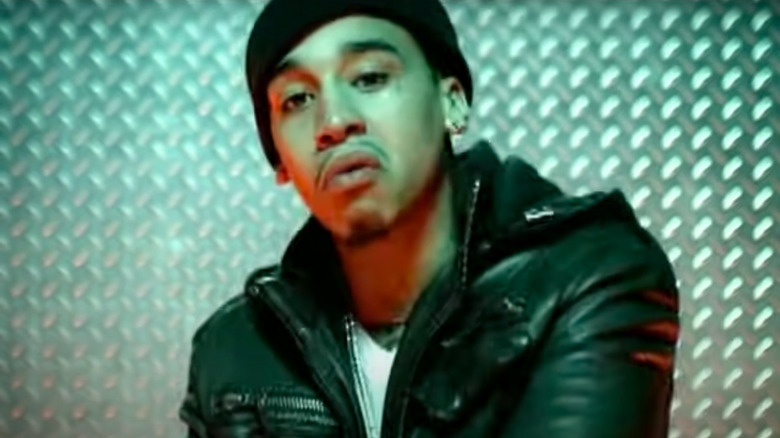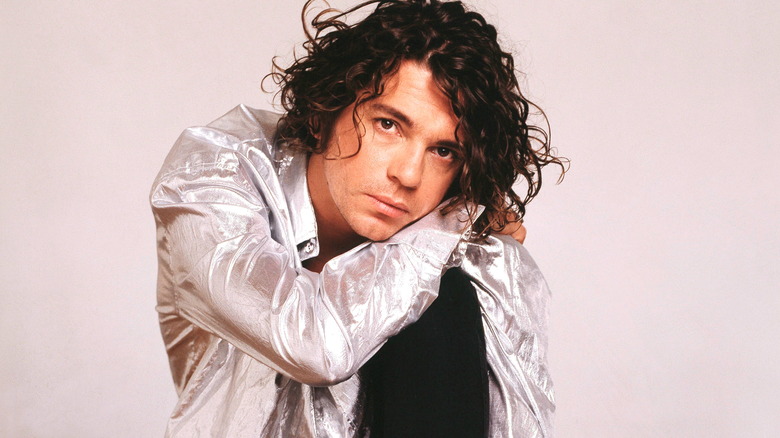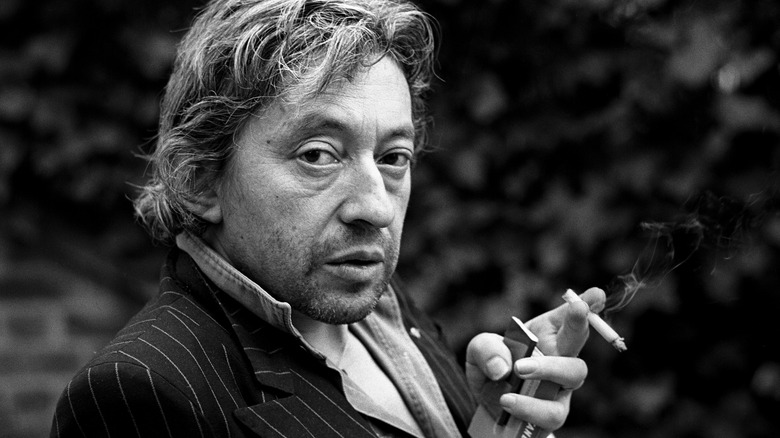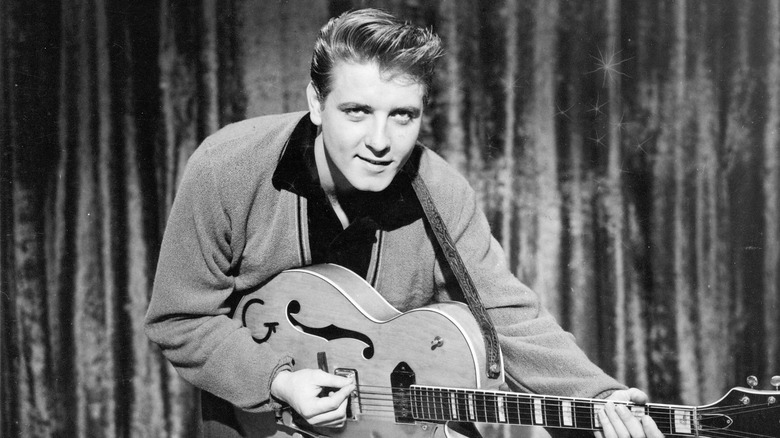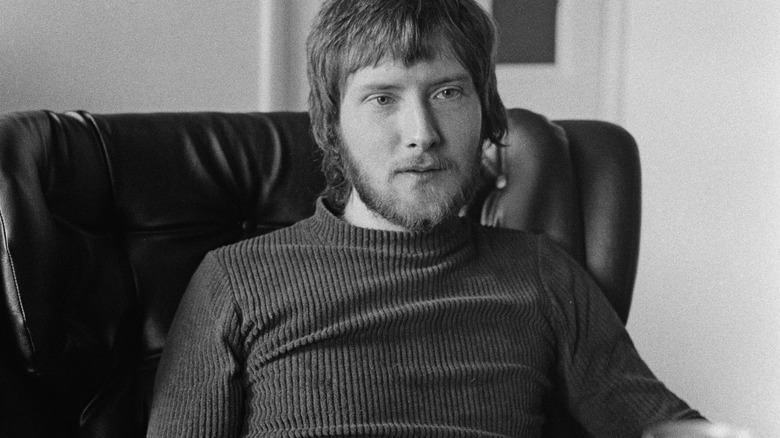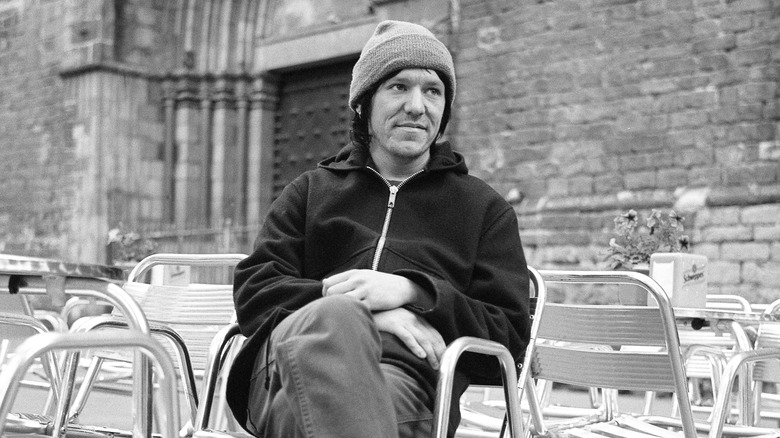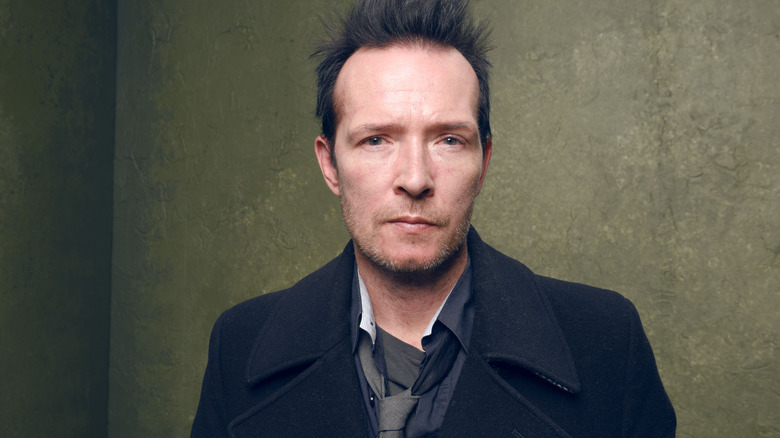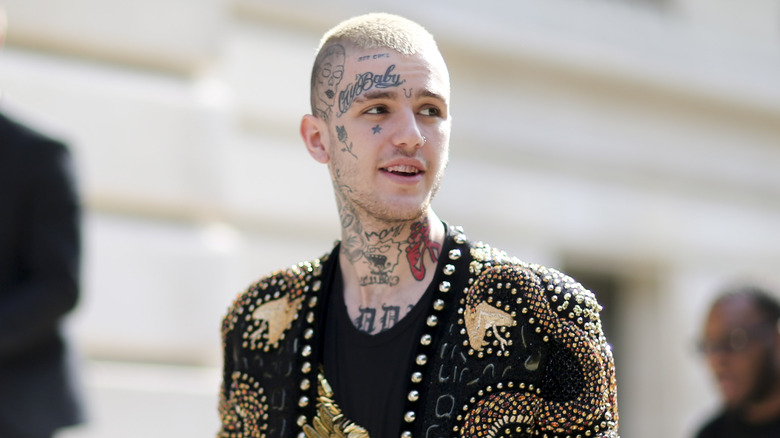Musicians Who Predicted Their Own Deaths
Don't fear the reaper. Like it or not, he's coming. Whether Death's scythe cuts you down in old age or gets you earlier with a disease or catastrophic accident, everyone has to face that hooded old skeleton at some point, and nobody wins. We're all doomed in the end, wacky cryogenic freezing theories notwithstanding.
Musicians often live the craziest lives, and far too many have died before hitting 30. Death is a scary subject, and many artists have written songs about it, pondering that eternal question of what's waiting on the "other side." However, some musicians have predicted their own deaths in a way that's weirdly accurate. Many of these cases probably have more to do with coincidence than actual psychic abilities — you be the judge — but perhaps other musicians had some sort of foresight or simply possessed a deep understanding of the social and societal conditions surrounding them.
Tupac
Tupac Shakur will go down in history as one of the greatest rappers of all time, and part of what made him such an iconic figure was his intelligent understanding of society and culture, as he always had his finger on the pulse of everything going on around him. For example, the man who made "Thug Life" into a household phrase had a strong feeling early on in his life that he'd never make it to old age. According to BET, back in 1994 Tupac told an interviewer that the best-case scenario he saw for himself in 15 years was either in a cemetery or cremated. Sure, he quickly corrected this to say he'd rather be a multimillionaire than dead. Still, that says something about a person's life.
This wasn't the only time Tupac expressed such certainty about an early death. According to Oxygen, in 1995 Tupac told Vibe magazine that he was giving them his final interview, expressing a desire to have his story told accurately before he died. Then, in 1996, he filmed the music video "I Ain't Mad at Cha," which depicted him in the afterlife, communicating with his loved ones. Just a few weeks later, Tupac was murdered in a drive-by shooting in Las Vegas. He was only 25 years old.
John Denver
Before John Denver became a folk music star, he was just a boy named Henry John Deutschendorf. Today, Denver will always be remembered for bonfire melodies like "Take Me Home, Country Roads" and "Annie's Song," but his first stepping stone toward musical stardom was his song "Babe I Hate To Go," according to CNN, which first became a hit when it was rerecorded by folk trio Peter, Paul and Mary under a new title: "Leaving on a Jet Plane." The lyrics to "Leaving on a Jet Plane" involve the singer saying goodbye to a loved one shortly before getting on plane, repeatedly stating that he doesn't know when he'll be back and that he hates to go.
These lines proved tragically prescient, though certainly not by design. In 1997, Denver was piloting his own private plane down the coast of California when the engine failed, sending him crashing into the ocean. He was the only person onboard. John Denver was 53.
Left Eye
Lisa Lopes, known best as "Left Eye," the rapper of TLC, was only 30 years old in 2002, but her life had already become an explosive cocktail of controversial headlines, domestic abuse, and public fallouts. Fighting to carve out a new career for herself as a solo artist, according to Dazed, Lopes knew she needed a minute to get away from it all, so she flew out to Honduras for a recovery sabbatical. At this point, sadly, things took a dark turn. A van she was riding in collided with a young boy, and the boy, whose last name was also Lopes, died from his injuries. Though Lopes had merely been a passenger in the van, she still paid for all of the boy's hospital and funeral costs. Lopes, according to the New York Times, was a firm believer in astrology and numerology, and was noticeably chilled by the fact that she and the boy's surname was Lopez. She became convinced that some sort of malevolent spirit was following her, meaning to kill her instead of the boy.
While still in Honduras on another road trip to get more footage, the car Lisa Lopes was riding in swerved off the side of the road, and she died in the crash.
John Lennon
The world recoiled in shock when John Lennon was murdered in 1980, but Lennon himself might've been less surprised than everyone else, according to The Guardian. As described by Freda Kelly, who worked as a secretary for the Beatles when she was a teenager, Lennon was always telling her that he'd never make it to age 40. He actually did make it to 40, but not to 41.
However, Kelly's story isn't the first time that someone has talked about Lennon's cynical expectations for his future. Newsweek writes that all the way back in 1965, Lennon told a reporter that he expected he and his fellow musicians would either die in a plane crash or be shot by "some loony." Admittedly, none of this is quite on the level of a Nostradamus prediction, as plenty of people have said similar things, but it's still pretty darn creepy.
Jeff Buckley
Jeff Buckley was yet another talented artist taken from the world far, far too soon. One song in particular that sticks out, though, is "Dream Brother," a haunting melody about drowning. It's hard not to be struck by the lyrics regarding a dark angel of death with black, feathery wings, but perhaps the most eerie line of all is "Asleep in the sand, with the ocean washing over," a sentence that strangely foretold exactly what was coming in Buckley's future.
Rolling Stone reported in 1997 that Buckley and a friend had decided to go take a dip in the Wolf River channel of the Mississippi River, with disastrous consequences. The river, known for being a risky place to swim, carried Buckley away and he disappeared. After six days of searching, his body was found washed up on the shore. At the time of his death, he was only 30 years old.
Michael Jackson
The public generally accepts the idea that Michael Jackson died from overdosing on a drug called Propofol, according to the BBC. But who was responsible? According to the courts, the answer was Jackson's doctor, Conrad Murray, who was found guilty of involuntary manslaughter. However, not everyone buys the notion that Jackson's death was an accident. The singer's daughter, Paris Jackson, told Rolling Stone she believes the truth is a lot more sinister. She hasn't yet publicly revealed who she deems responsible, but she says everyone in her family agrees with her on this.
One major piece of evidence? Michael Jackson himself, according to The Guardian. In his last weeks alive, Jackson wrote letters to one of his closest friends claiming he was going to be murdered and was terrified for his life. Rolling Stone also points out that Jackson's ex-wife Lisa Marie Presley once told a similar anecdote to Oprah regarding the singer's belief that someone wanted him dead, allegedly in order to seize the money from his music publishing catalog. What really happened? Was Jackson scared of a real threat, or was it just paranoia?
Warren Zevon
Warren Zevon, the artist most famous for "Werewolves of London," also wrote a song called "The Factory" in 1987. Despite its seemingly upbeat sound, the lyrics of "The Factory" tell the story of a man following in his father's footsteps, slaving away in a factory to support his family and eventually inhaling cancerous substances like polyvinyl chloride, plastic, and asbestos.
Decades later, tragedy struck ... or at least, a prior tragedy made itself publicly known. What Warren Zevon didn't realize when he wrote the song was that his own exposure to asbestos — which probably happened during his childhood, when asbestos was all over the place — had caused irreversible damage to his lungs. According to Mesothelioma.com, Zevon was diagnosed with pleural mesothelioma in 2002 and given a terminal prognosis. Zevon declined treatment and spent the last months of his life finishing up his final album, "The Wind," which he released just before he died in 2003.
Avicii
Avicii saw it coming. As pointed out by Cosmopolitan, the Swedish musician and DJ behind "Wake Me Up," whose real name was Tim Bergling, said in a 2017 documentary that if he didn't retire from performing, he was going to die. This certainty of impending death seems to be what motivated his 2016 retirement, as he felt that his health problems and alcoholic tendencies would overwhelm him if he didn't step back from the spotlight. But he said he still felt a constant pressure to do more gigs, despite the anxiety it gave him.
Sadly, in 2018, Avicii was found dead in Oman's Muscat Hills Resort. Bergling's family later released a public statement that implied he had killed himself. At the time of his death, Bergling was only 28 years old.
If you or anyone you know is having suicidal thoughts, please call the National Suicide Prevention Lifeline at 1-800-273-TALK (8255).
Patsy Cline
Despite the fact that Patsy Cline's career only lasted about five years, she has come to be recognized as one of the most iconic country music singers of all time, and she could've easily continued singing for decades. Everyone thought Cline had a long career ahead of her, except Cline herself. According to her friends, Cline herself always had a strange sense she was going to die soon, as described in Country Living, and in 1963 she reportedly told fellow singer Ray Walker that after surviving two car accidents, she expected a third one to kill her. A week after telling him that, she died in a plane crash.
It gets stranger. Some time before that, Cline was riding on a commercial flight to Kansas City, according to Douglas Gomery's "Patsy Cline: The Making of an Icon," when she was suddenly so overcome with a desire to write out her will that she scrawled it onto a piece of stationery. Patsy Cline was 30 years old.
Jackie Wilson
Back in his day, Jackie Wilson — also called "Mr. Excitement" — was known for being an unforgettable performer who put out over 50 hit singles in his lifetime. According to the Winston-Salem Journal, though, his personal life was more troubled, often plagued by relationship problems, personal drama, and alcoholism.
In 1975, Wilson was on stage in New Jersey belting out his famous song "Lonely Teardrops," when he was struck by a heart attack. In a tragic twist, the words Wilson was singing as his chest seized up were, reportedly, "My heart is crying." Wilson collapsed before the audience and was rushed to the hospital. He didn't die that day, but his bumpy path continued. He spent a few months in a coma before regaining consciousness, but not mobility or the ability to speak. He was transferred between various care facilities in a vegetative state for almost nine years before finally passing away in 1984.
XXXTentacion
XXXTentacion, or Jahseh Dwayne Onfroy, was a character, to put it mildly. The rapper rose to prominence after dropping his first track on SoundCloud in 2014, and he released his first studio album in August 2017. But his musical success wasn't the only thing that came to define him. In 2016 it emerged that XXX had a penchant for assaulting and abusing his girlfriend, Geneva Ayala, which she said was a frequent occurrence. Among other things, she said he beat her and threatened to cut out her tongue because she was singing another musician's song. He would also reportedly threaten to kill himself to keep Ayala from breaking up with him. In October that year, he allegedly strangled her, severely beat her, and locked her up for two days because she was pregnant. She went to the police, and XXX was arrested.
The trial over the harrowing incident kept getting pushed back, through 2017 all the way into 2018. At some point in early 2018, XXX posted a video to Instagram of him apparently driving a car and speaking straight to the camera: "Worst thing comes to worst, I f***ing die a tragic death or some s**t, and I'm not able to see out my dreams, I at least want to know that the kids perceived my message and were able to make something of themselves and able to take my message and use it and turn it into something positive. To have a good life. ... If I'm gonna die, or ever be a sacrifice, I want to make sure that my life made at least ... 5 million kids happy — or they found some sort of answers or resolve in my life. Regardless of the negative around my name."
The court case never happened. On June 18, 2018, XXX was shot to death in Florida in what police believe was a drive-by shooting. Jahseh Dwayne Onfroy was 20 years old.
Mac Miller
It's a little less astonishing when a drug addict predicts his own demise because drug addicts are sort of dancing with death on a daily basis. But there was some eerie stuff preceding the death of rapper Mac Miller — his last music video for the single "Self Care" featured an image of himself lying in a casket. The theme of the video was the downward spiral of addiction, and it even included a scene where Miller carves the Latin phrase "Memento mori" into the casket. (If you avoided Latin in school, that means "Remember that you have to die.")
Miller wasn't exactly secretive about his drug problem — in 2013, he told Complex that he'd had a hard time dealing with criticism after his first album, especially when it seemed deliberately cruel. "A lot of the reviews were more on me as a person," he said. To be fair, he was really just a kid when his first album came out, but he handled the weight of all that negativity badly, by taking promethazine, a drug that is used to treat allergies and motion sickness. Promethazine is a strong sedative that can become addictive, and it can be deadly when taken in excess.
Promethazine didn't kill him, though. In fact he kicked that particular habit and moved on to some more serious stuff — the coroner reported that the rapper died from a lethal cocktail of fentanyl, cocaine, and alcohol.
Lynyrd Skynyrd
Lynyrd Skynyrd's 1977 album was full of creepy stuff, which not only seemed to foretell doom but also seemed to predict how it was all going to go down.
The album "Street Survivors" was released just three days before the horrible plane crash that killed front man Ronnie Van Zant. And what's especially awful about the story is that the band wasn't exactly blindsided by the accident because just two days before the crash Rolling Stone says they'd all seen 10-foot flames shooting out of the right engine of their Convair. The good news is that they were going to trade their flaming death trap of a plane for a Learjet after using it for just one final trip. The bad news is during that one final trip the Convair fell out of the sky into a Mississippi swamp, killing six people.
How did the album connect to the tragedy? Well for a start, the cover featured a photo of the band engulfed in flames. And if that doesn't give you chills, the track titled "That Smell" contained the words, "Say you'll be all right come tomorrow, but tomorrow might not be here for you," "Angel of darkness upon you," and "The smell of death surrounds you."
Now, it's not that weird for rock stars to sing about death, but the timing of this particular album and its prophetic lyrics does seem pretty creepy.
Mikey Welsh
Weezer's former bassist Mikey Welsh posted some weird and scarily specific words to his Twitter account in September 2011, just two weeks before he died. "Dreamt I died in Chicago next weekend (heart attack in my sleep). Need to write my will today." He then went back and added, "Correction — the weekend after next."
According to Billboard, the 40-year-old was found unresponsive in his Chicago hotel room two weeks later, exactly as he'd predicted. An official cause of death was never released (or was maybe just kept quiet), but authorities at the time believed it was a combination of prescription narcotics and heroin — prescription drugs and a plastic bag full of white powder were found in the room. If it's true that Welsh's death was drug-related, though, the Twitter prediction seems less strange because his death could have been intentional. Predicting your own suicide is all kinds of tragic, but not necessarily prophetic.
Not everyone believes that Welsh's death was intentional, though. In a statement, Weezer said this: "We know damn well he would never have wanted to stop the rock at today's RIOTfest, the show he was planning on attending. On the contrary, the rock was what he loved, both in music and art."
If you or anyone you know is having suicidal thoughts, please call the National Suicide Prevention Lifeline at 1-800-273-TALK (8255).
D12's Proof
The D12 rapper Proof was in a nightclub in his hometown when he was shot and killed during an argument. Two years before that, on the 2004 album "D12 World," he rapped: "I'm in the club to beef, you gotta murder me there," which is really creepily specific considering that he was very much murdered in a club.
The circumstances of Proof's death were made a little weirder by his participation in Eminem's 2005 music video for "Like Toy Soldiers," which is about the murder of D12 member Bugz. Proof plays the deceased rapper, even re-enacting his murder for the music video. Seeing Proof acting out a situation similar to his own death years later is a bit eerie.
Now we don't want to make something creepy seem less creepy, but it's worth noting that Proof spent a lot of time in clubs, so statistically speaking it maybe wasn't that weird that he was murdered in a club because of how much time he spent there. On the other hand, murder is not a super-common cause of death (in the U.S., it's around 6 for every 100,000 people), and Proof's friend H. Mack told the Guardian that Proof wasn't the sort of guy who would initiate a gun fight over something stupid, so there's not much reason to feel like that was an especially likely way for Proof to go. So was that line from the song prophetic or merely a weird coincidence? That probably depends on how much you believe in prophecies and weird coincidences.
Merle Haggard
Country music star Merle Haggard probably knew he was going to die just based on everything his body had been through in the last few months of his life — according to Heavy, Haggard's health had forced him to cancel a number of shows, and his diagnosis of double pneumonia was pretty dire for an almost-79-year-old. But the weird thing about Haggard's death is that the singer seemed to know exactly the day of his death, a week before it actually happened.
"A week ago dad told us he was gonna pass on his birthday, and he wasn't wrong," Haggard's son Ben said on Instagram on the day of his father's death. "An hour ago he took his last breath surrounded by family and friends."
It could have been a lucky guess, or perhaps Haggard was so in tune with his body that he instinctively knew how many days were left in him. Or maybe the zen of dying exactly 79 years to the day after your own birth was just too good for "the working man's poet" to pass up.
Peter Steele
Type O Negative front man Peter Steele was preoccupied by death — he not only wrote a lot of songs about death and dying, he also regularly predicted his own death, attempted suicide, and at one point even faked his own death. According to Loudwire, in 2005 the band posted an announcement on their website that Steele had died when he had, in fact, been involuntarily committed to a psychiatric hospital.
So really, it's not that weird that Peter Steele predicted his own death because he'd been doing it for years. What is maybe weirder is that he seemed to predict the exact manner of his death. It was the lyrics from the 2003 song "I Don't Wanna Be Me" that were especially creepy: "Two steps forward, two steps back. Without warning, heart attack."
Seven years later the 48-year-old singer was sick in bed with the flu, when he unexpectedly died from an aortic aneurysm. That's not technically the same thing as a heart attack — an aortic aneurysm is actually a bulge in the aorta that can burst, or lead to other problems including heart attack and stroke. It's not clear which of these secondary problems led to Steele's death, but let's just say that those lyrics from 2003 came close enough.
Phil Lynott
Heart disease is responsible for one in every four deaths in the United States. If you had to guess how you were going to die and you said "heart problems," you'd have a 25% chance of being correct. Those are actually pretty good odds. Or terrible odds, depending on your perspective.
Like Peter Steele, Phil Lynott also predicted that he would die from a heart attack, or at least that's what he sang about in "Heart Attack," which appeared on the 1983 Thin Lizzy album "Thunder and Lightning." He was not very old when he died, though — just 36 — and that's not an age where you would typically expect someone to die from heart failure. Unless of course there were other factors at play.
The lyrics included lines like, "Mama I'm dying of a heart attack," "My heart can't handle the strain that's shaking it," and "Papa I'm dying of an overdose." And according to the Irish Times, Lynott died three years after he sang those words, from heart failure and pneumonia — all believed to be complications from a lifetime of substance abuse.
Bob Marley
Lots of people believed that Bob Marley was a kind of prophet, sort of like Nostradamus only with musical talent and cool hair. According to the book "Bob Marley: Musician," Marley's mother often claimed that he was able predict the future even as a small child, and some people believe he also predicted the modern wars in Ukraine, Iraq, and Syria. But perhaps the weirdest of all his predictions was the one about his own death. At the age of 24, he told friends exactly what age he'd be when he died. "I know I'm going to die at 36," he said.
In 1977, Marley was diagnosed with melanoma under the nail of his big toe. Doctors recommended amputation, which is unfortunate because as a Rastafarian, Marley believed that amputation was sinful. So he refused treatment, and by the summer of 1980 the cancer had metastasized throughout his body. He flew to Germany in the hope that a doctor who peddled "controversial" cancer treatments might offer a cure, but (shockingly) holistic medicine didn't seem to help. Marley decided to return to Jamaica to die, but he didn't make it that far — he died en route during a stopover in Miami, on May 11, 1981. He was 36.
Mitch Lucker
Just in case you didn't know that motorcycles are death traps, motorcycles are totally death traps. Yeah, they're fun, but they could also kill you. Especially when you mix motorcycles with alcohol, which makes them extra death-trappy.
Mitch Lucker, who was the front man for Suicide Silence, died from injuries sustained in a motorcycle accident on November 1, 2012. According to Blabber Mouth, Lucker's wife said he'd been drinking before he left the house. "He was an alcoholic, and it's been a big battle," she said during the candlelight vigil that followed the singer's death. "I tried to stop him. I was in front of him begging him not to leave the house. Begging him."
After Lucker's death, fans pointed to the eerie photo he posted to Instagram (above) just hours before the accident as evidence that he'd somehow predicted his own death. In the photo, Lucker is wearing Day of the Dead-style skeleton makeup, and the caption reads, "The dead are living ..." Of course this creepy coincidence does seem somewhat less creepy when you consider that Lucker posted the photo on Halloween, which is traditionally a day that people put on scary makeup. Why a skeleton, though, and not like Batman or Darth Vader or something? Maybe he subconsciously knew something that everyone else did not. Or maybe that just wasn't his style.
Prince
In April 2016, the whole "Prince predicted his own death" thing was all over the Internet, which certainly made for some sensational headlines and probably also contributed to a gigantic spike in Prince album sales. But did he really predict his own death? Yes, if you think that acknowledging one's own mortality is somehow prophetic. "Sometimes I wish life was never-ending," he sang in "Sometimes it Snows in April," from the 1986 album "Parade." "And all good things, they say, never last." Umm ... okay. So the fact that he sang about how life doesn't go on forever was somehow predictive of his death several decades later?
That's not the only set of song lyrics that some fans seemed to think was prophetic, though. In "Let's go Crazy," he sings about an elevator. And he was found unresponsive in an elevator. So is that spine-tingling or is the sensation more of an eye-roll? We'll let you decide.
According to E! News, though, there's just one final piece of evidence that points to a prophecy — three years before he died from an overdose of fentanyl, Prince's sister says he called her and said, "I think I've done everything I've come to do." Which would have been eerie if it had happened three days before his death, but it seems that Prince had at least three years' worth of things to do, after all.
Amy Winehouse
And because tabloids are such awesome sources of information (that was sarcasm), here's a final death prediction for you to ponder.
According to Music News, singer Amy Winehouse's friend Alex Foden said she knew she wasn't destined for a long life. "Amy always told me she thought she would die young and that she knew she'd become a part of the '27 Club,'" which by the way is that long list of artists who died at the age of 27, including such notables as Janis Joplin and Kurt Cobain. And Winehouse did, in fact, die in 2011 at the age of 27.
The coroner's report revealed that Winehouse died from alcohol poisoning. That may not be too surprising, really, because the singer was given to doing everything in excess. She was not only prone to overindulging in drugs and alcohol, she also had bulimia, which had likely left her body too weak to handle all those other excesses.
Let's just ignore the fact that you could reach into history and also find lots of famous people who died at the age of 26 and plenty of famous people who died at the age of 28. But for some reason we only think it's spooky that some famous people have died at age 27. Anyway, it is a little odd and it's also very tragic that Winehouse supposedly predicted that she would die so young, but it's not so unusual that she did.
Arnold Schoenberg
A lot of people get a kind of uneasy feeling on Friday the 13th. Even if nothing bad has ever really happened to you on that particular day, you probably still look at your calendar and think, "Crap, I should be extra careful going down the stairs this morning," or, "Maybe I should avoid answering the phone." Arnold Schoenberg, though, was so afraid of 13 that his fear might have killed him.
Schoenberg was an Austrian composer famous for writing music that sounds kind of like it belongs on the soundtrack of an "Indiana Jones" sequel. According to the Mahler Foundation, he suffered from triskaidekaphobia, which is the fear of the number 13. And it wasn't the number 13 alone, either — he was also afraid of multiples of the number 13. Schoenberg especially dreaded the year 1939 because 39 is three times 13, and that equals BAD.
When 1939 ended and Schoenberg was still alive, he moved on to believing that he'd die at 76 because seven plus six equals 13. This time, he was right — he died on Friday, July 13, 1951, two months before his 77th birthday. His wife appears to have also been convinced that the date was somehow responsible for his demise — on the night of his death, she recalled noting that it was 11:45 PM and thinking that the worst would be over in a quarter of an hour. But her husband didn't make it that far. He died only minutes later.
Jim Morrison
Jim Morrison was obsessed with death, so it's not really shocking that he predicted his own demise. Frankly, the dude was so obsessed with death that he probably predicted his own demise most nights of the week, and the only reason we even remember this particular occasion was because he happened to get it right.
Morrison wasn't exactly a specimen of good health, either. Like a lot of his fellow rock superstars, he liked to live hard and was usually drunk or on some substance or another. Now, when you're a hardcore drug user, you probably kind of know that you're going to end up killing yourself eventually, so it's not really that freaky for a drug addict to say, "I'm going to die soon," given that it's kind of a logical conclusion. But Morrison's prediction was pretty specific. According to The Weeklings, after the deaths of Jimi Hendrix and Janis Joplin — both musicians were 27 — Morrison, who was also 27, told a friend, "You're drinking with number three." Not long after that, he died unexpectedly in the bathtub of a Paris apartment.
His official cause of death was heart failure, and if that's true, then his prediction is a little bit eerie. But it seems more likely that he died from an overdose. After all, it's not super likely that his girlfriend would have been keen to tell Paris police that there were drugs in the apartment.
Debbie Reynolds
Toward the end of her life, Debbie Reynolds was probably better known for being Carrie Fisher's mother than she was for her music. But early in her career, she was a singer, and in 1952, she starred opposite Gene Kelly in the musical "Singin' in the Rain." She was in a lot of musicals, in fact, and she starred on Broadway, too, before doing some more mainstream films like "The Bodyguard" and "Behind the Candelabra." Along the way, she also became a parent, and her daughter became an even bigger star than her mom was.
According to People, Reynolds referred to Carrie Fisher's history of substance abuse as her "demons" and often worried about losing her daughter. "It's not natural to outlive your child," she wrote in her 2013 autobiography "Unsinkable." "This has always been my greatest fear ... I don't know if I could survive that." Just three years later, Fisher went into cardiac arrest while on a flight from London to Los Angeles and died at the age of 60. A day after her daughter's death, Reynolds was at her son's home planning the funeral when she suffered a stroke. She died at the hospital later that day, but not before telling her son, "I miss her so much. I want to be with Carrie." Her son told ABC News (via HuffPost) that she died from "heartache."
Whitney Houston
Whitney Houston's health wasn't exactly in decline – Vanity Fair says she was doing handstands beside the hotel pool in the days before her death — but she did have a long history of drug abuse. And people who use a lot of drugs do tend to kind of have a sense of doom hanging over themselves all the time, especially as they get older and don't feel so invincible anymore.
Houston was in Los Angeles for a pre-Grammy Awards party and brought along some of her usual vices, but her luck ran out. On the afternoon of February 11, 2012, she was discovered dead in a hotel bathtub. The coroner ruled her death an "accidental drowning," with "contributing factors" of cocaine use and heart disease. Still, she was only 48, and her death was pretty unexpected — except maybe to Houston herself. According to TMZ, she'd recently told friends that she thought the end was near, and she'd even said, "I'm gonna go see Jesus ... I want to see Jesus."
Houston got her start as a gospel singer, so it wasn't unusual for her to talk about religion, but her friends said she'd become a lot more spiritual during her final days. And there was no evidence that her death was anything other than an accident, so it does kind of seem like she saw something coming that no one else could see.
Buddy Holly
Just about everyone has had a death dream that seemed terrifyingly real, but for most of us, nothing ever comes of such things. A dream about drowning is much more likely to be metaphorical than prophetic. But according to "Take a Walk on the Dark Side: Rock and Roll Myths, Legends, and Curses," Buddy Holly had a dream that turned out to be prophetic in a terrifyingly specific way, and just in case that wasn't enough to make you a believer, his wife Maria Elena also had a prophetic dream about his death ... on the exact same night.
In Maria Elena's dream, she was standing in a field, and people were running past her. She looked up and saw a fireball falling from the sky, and then she heard a crash and an explosion. When she woke Holly to tell him about the dream, he said he'd also had a nightmare. In his dream, he was in an airplane with Maria Elena and his brother, but for some reason, he decided to leave Maria Elena behind, dropping her off on the top of a building. The thought that he would leave his wife behind upset him so much that as he described the dream to her, he burst into tears.
Then, on February 3, 1959, Buddy Holly got in an airplane, leaving his wife behind. And the plane crashed in a field.
Juice WRLD
Even when young stars are known substance abusers and seem to be careening toward certain doom most of the time, it's still shocking when they die young. According to the BBC, Juice WRLD died six days after his 21st birthday after suffering a seizure brought on by an overdose of oxycodone and codeine. And what's especially gut-wrenching is that he not only seemed to see it coming, but he even wrote about it. The single "Legends" contains the ominous phrase, "What's the 27 club?" We ain't making it past 21."
It gets even weirder than that, though. In the same song, Juice WRLD laments the early death of XXXTentacion, who died when he was 20: "They tell me I'm-a be a legend, I don't want that title now, 'Cause all the legends seem to die out, What the f*** is this about?" Then, just a few days before his death, he tweeted, "This life is yours do what tf you want do great things and change the world don't let no one tell you S**T ... and you'll be bigger than 'juice wrld' will ever be, and he's going down as a legend."
So just to recap, Juice WRLD said he wasn't ready to be a legend yet, because legends always seem to die young. Then, after claiming he would actually go down as a legend, he died young.
David Bowie
In David Bowie's final video, he floats above the sheets of a hospital bed and backs into a wardrobe that looks an awful lot like a coffin. You might say this was Bowie foretelling his own death, but that's silly — Bowie had a terminal diagnosis and was well-aware that he was dying as he was filming the video. "Lazarus" was released just four days before he died, and the only future knowledge it contained was the same foreknowledge all terminal patients have when they finally reach the end of a long illness.
But Bowie had known for years how old he would be when he died. According to NME, in the late 1970s, a psychic told him he would live to be 69 or 70. (It might also have been a prophetic dream. Versions of the story vary.) And Bowie didn't just ha-ha the news — he made plans. Mike Garson, who played piano for Bowie on nine of his albums, later said the psychic Bowie consulted with was "real," and, "David knew it and didn't doubt it for a second. He told me about it with certainty, accepted it, and planned for his future based on that." As it turned out, the age-of-death prediction turned out to be eerily accurate, and he was right to pay attention. Bowie was diagnosed with liver cancer in 2014 and died from the disease just 18 months later at the age of 69.
The Notorious B.I.G.
The Notorious B.I.G. (real name Christopher Wallace), along with his hip-hop contemporaries 2Pac, Jay-Z, and Ice Cube, is considered one of the legends of 1990s rap, notes Complex. Interestingly enough, he only released one album before his untimely death at the age of 24, but his legacy remains forever. "[His music] is still just as impactful, as if he were this new, dope rapper," mused Wallace's widow, Faith Evans, to CNN in 2017, dubbing his lyrics "absolutely timeless."
Per History, Biggie was murdered on March 9, 1997, the result of a drive-by shooting in Los Angeles. As of this writing, Biggie's death remains unsolved. What's unsettling to note is the rapper's paranoia that somebody was coming for him. "I think somebody is trying to kill me," he told A&E's "Biggie: The Life of Notorious B.I.G.," adding, "I be waking up paranoid. I be really scared." What's more, during one of his final interviews at San Francisco's KYLD-FM (via MTV), Biggie mused about being a target: "They gonna' attack you if you on top."
Outside of interviews, the "Hypnotize" rapper also allowed this prophetic fear to seep into his work. Death was a topic he often rapped about, as can be heard on "You're Nobody (Til Somebody Kills You)" and "Suicidal Thoughts," where he even raps about his funeral: "People at the funeral frontin' like they miss me." It turns out, the actual procession route was filled with "thousands" of his fans, per Daily News.
Marc Bolan
T. Rex was one of the U.K.'s most memorable glam rock bands of the 1970s. Fronted by Marc Bolan (who formed the band in 1967), the group "sold four million odd records" in 1971 alone — something that Rolling Stone notes is "more than four percent of the entire British market." According to AllMusic, Bolan himself was incredibly influential, and his on-stage persona and fashion sense would eventually inspire a variety of different genres, ranging from metal to even new wave.
T. Rex continued to make music throughout the '70s (albeit with some of the lineup changing), yet Bolan never got a chance to see how his band would fare in the following decade. On September 16, 1977, Bolan and his girlfriend, Gloria Jones — a keyboardist in T. Rex — got in a car in London with Jones behind the wheel. As reported by BBC, the vehicle tragically crashed into a tree after veering from the road. While Jones survived, Bolan died instantly.
It turns out that the singer was never comfortable in cars, with his former manager, Tony Secunda, telling BBC that he never bothered learning to drive due to a fear that "he would die in a car crash." What's more, the lyrics to T. Rex's 1972 song, "Solid Gold Easy Action," seemingly predicted the circumstances of his death. "Life is the same and it always will be / Easy as picking foxes from a tree," Bolan croons. Thinking about his lyrics and the correlation between speaking about life and a tree seems eerily prescient.
Johnny Horton
Honky tonk crooner Johnny Horton came from humble beginnings. Per AllMusic, after graduating from high school in 1944 (and a brief stint at a Methodist seminary), Horton began traveling America, ending up in Alaska in 1949, working as a fisherman and writing songs in his spare time. In 1950, he won a contest hosted by country star Jim Reeves, who convinced Horton to perform professionally. Starting with the stage name, "The Singing Fisherman," Horton eventually got signed to Mercury Records in 1952, causing an onslaught of touring, which ultimately led to the downfall of his first marriage, and subsequent divorce (via Wide Open Country).
In 1953, Horton remarried, this time to Hank Williams' widow, Billie Jean Jones. Yet even marital bliss didn't squash the crooner's paranoia — according to "Poetry Train America," by John E. Wordslinger, Horton allegedly "had premonitions of his death," telling those closest to him that he would "die at the hands of a drunk." Nevertheless, Horton's star only rose, even winning a Grammy in 1959. Sadly, after a gig at Austin's Skyline Club on November 5, 1960, Horton and his bandmates got in a car and drove towards Shreveport, Louisiana, where they were hit by a truck. Horton died en route to the hospital, and it was later on revealed that the truck driver was, indeed, drunk (via "Poetry Train America").
To make things even eerier, Horton and Williams — both married to Jones at one point – played their final shows at the Skyline Club before their untimely deaths.
If you or anyone you know is struggling with addiction issues, help is available. Visit the Substance Abuse and Mental Health Services Administration website or contact SAMHSA's National Helpline at 1-800-662-HELP (4357).
Aaliyah
Aaliyah Dana Haughton, known as Aaliyah by her legions of fans, will forever be remembered as the "Princess of R&B." According to Spin, at only 22 years old, the singer "already had one gold and two platinum albums to her credit," while also embarking on what was to be a fruitful career as an actor, too. Simply put, Aaliyah was at the peak of her success.
With three albums under her belt, in August of 2001, Aaliyah jetted off to the Bahamas to film a music video for her single, "Rock the Boat," per Rolling Stone. As revealed by VH1's "Behind the Music," the singer was "anxious" to first board the plane heading to Abaco Island, yet reluctantly agreed. Aaliyah's boyfriend, Damon Dash, told "The Real" in 2016, "She was like, 'I don't like that plane ... It was a complicated situation, but she had to go do that video."
Sadly, Aaliyah's fears came true. On August 25, the singer and her crew were prepped to head back to Florida, boarding a 10-seat twin-engine Cessna 402B. Under a minute after takeoff, the plane crashed, with Aaliyah killed instantly (via Rolling Stone). According to MTV, the music video's director, Hype Williams, still released "Rock the Boat," hoping Aaliyah's fans "would enjoy it." Noting the obvious "pain" of the final product, he added, "that's all the more reason people would appreciate what we've done as a group."
Kurt Cobain
There's no denying that Nirvana defined the grunge movement that took over in the 1990s. Formed by Kurt Cobain in 1988, it's after the band's second album — 1991's "Nevermind" — that Nirvana gained worldwide recognition (via Biography). Unfortunately, this was around the time that Cobain started using heroin, too. "I didn't know how to deal with [the fame]," the artist mused to Rolling Stone in January 1994 — the same year he met his tragic fate. "If there was a Rock Star 101 course, I would have liked to take it. It might have helped me."
But did Cobain predict his abrupt success? Even more, did he know his death was to follow shortly after? According to "Heavier Than Heaven," by Charles R. Cross, one day, while Cobain was 14, he suddenly told his classmate John Fields, "I'm going to be a superstar musician, kill myself, and go out in a flame of glory." While Fields brushed off the statement, the future rocker was unwavering in his prophecy.
On April 5, 1994, Cobain stayed true to his prediction many years ago, died by suicide inside his Seattle home, per History. As revealed by Rolling Stone, Nirvana fans around the world were affected by the frontman's death.
If you or anyone you know is having suicidal thoughts, please call the National Suicide Prevention Lifeline at 1-800-273-TALK (8255).
Big L
While Big L may not have achieved such mainstream success as that of The Notorious B.I.G. or 2Pac, for example, he's still considered a great within '90s rap circles. Per Rolling Stone, while the rapper (real name Lamont Coleman) only released one album during his lifetime, his legacy has grown in the years since, with many hip-hop aficionados dubbing him "your favorite rapper's favorite rapper."
Sadly, Big L's life was cut short before he could make an even more significant impact within the hip-hop community. On February 15, 1999, the rapper was fatally shot in front of his home in Harlem (via MTV). Like his peers of the decade, Big L frequently rapped about violence, yet as his posthumous album revealed, it seems like the artist may have predicted exactly how he would die. According to MTV, the sophomore effort was dubbed "The Big Picture," including the song "Casualties of a Dice Game." In the song, he raps, "I watched all of them, run for they share / And all I can do was stare / I got weak and fell on my rear / Now I can hear the sirens, that means here comes the Jakes / But it's too late, I'm knockin' on the pearly gates."
In 2002, a BBC article highlighted "violence and hip-hop," citing Big L's death alongside some of his contemporaries as a byproduct of their music. Yet, as hip-hop critic Angus Batey explained, "you can't blame the music for something like this."
Dolla
Roderick Anthony Burton II, professionally known as Dolla, never saw the sort of A-list fame he aimed to achieve before his death on May 18, 2009. As detailed by Billboard, the rapper had a difficult upbringing in Los Angeles, having witnessed his father's suicide at the age of 5. Subsequently, he turned to a life of drug dealing a mere five years later as a means to help provide for his mother and sister. Honing in on his dream of becoming a rap star, Dolla attracted the eyes of Missy Elliott and Sean "Diddy" Combs, the latter of which invited him to become a model for his clothing line.
Dolla eventually met singer Akon, which led to a record deal with Jive, and released his first single in 2008. He never got a chance to release a full-length album — yet his single, "Georgia Nights," eerily foreshadowed what was to tragically come. As Dolla rapped, "My poppa died by the gun, I'll die by the gun / And if I ever have a son he'll probably die by the same."
According to the Los Angeles Times, Dolla was fatally shot in a garage of an L.A. shopping mall by Aubrey Berry, a man who claimed that the rapper "kicked and punched him 11 days earlier at an Atlanta nightclub." Berry alleged that he shot Dolla in an act of "self-defense," as he was convinced Dolla was carrying a gun. Although it was confirmed that the artist had no weapon on him, Berry was acquitted.
If you or anyone you know is having suicidal thoughts, please call the National Suicide Prevention Lifeline at 1-800-273-TALK (8255).
Michael Hutchence
While INXS formed in the late 1970s, it took about a decade for the Aussies to become international musical heavyweights with the release of their sixth album, "Kick," in 1987 (via Rolling Stone). Fronted by Michael Hutchence, INXS was a welcome blend of genres, dabbling in new wave, a "danceable" type of rock, and even funk.
However, it appeared that success was starting to weigh heavily on Hutchence. The documentary about the rocker, "Mystify," was released in 2020, with Rolling Stone's review revealing that although Hutchence "was a natural" when it came to singing and writing lyrics, being a part of a successful rock band was draining for the star. Sadly on November 22, 1997, Hutchence was found dead in his hotel room in Double Bay, Australia. According to the Herald Sun, the singer had hung himself with his body "found kneeling on the floor and facing the door." While some have suggested his death was the result of an accidental "act of auto eroticism," others believe it was a planned suicide. According to the singer's girlfriend at the time, Michelle Bennett, Hutchence had never hinted at the latter.
Interestingly enough, two INXS songs seemingly corroborate the two separate theories surrounding his death. In the song "Bang the Drum," Hutchence sang, "Oh baby, grab a noose cause we're looking for a different end," while on "She Is Rising," he hints towards death and reincarnation.
If you or anyone you know is having suicidal thoughts, please call the National Suicide Prevention Lifeline at 1-800-273-TALK (8255).
Serge Gainsbourg
Serge Gainsbourg was to France what Frank Sinatra was to America. As Vanity Fair puts it, he was the country's "most adored singer-songwriter," a man known for his turbulent life behind the microphone just as much as he was in front of it. "What he did was way ahead of its time," mused Gainsbourg's daughter, Charlotte, to the magazine, adding, "He was just so very authentic." But along with the praise of his lyrical wit came the understanding that the singer didn't exactly live a healthy life. Per The New York Times, since his career began in the 1950s, Gainsbourg was known to drink heavily and chain smoke incessantly.
The singer's unhealthy habits finally caught up to him in 1973. According to The Guardian, the "La Javanaise" crooner suffered his first heart attack at the age of 45. Allegedly, he continued to smoke secretly while in the hospital — and after he got out, leading to the heart attack that eventually killed him on March 2, 1991.
It appears that Gainsbourg was, at the very least, aware of his health struggles — to the point where he was weirdly prophetic. As The Washington Post notes, in 1981, he gave an interview with France's Liberation magazine, which was eventually released posthumously. In the interview, Gainsbourg creatively mused as an already dead man, saying, "It was the heart that let go," causing his death. When asked what year this happened, Gainsbourg predicted "1990" — close enough.
If you or anyone you know is struggling with addiction issues, help is available. Visit the Substance Abuse and Mental Health Services Administration website or contact SAMHSA's National Helpline at 1-800-662-HELP (4357).
Eddie Cochran
February 3, 1959, will forever be remembered as "The Day the Music Died" by pop culture historians around the globe. According to Biography, this was the day that Buddy Holly, Ritchie Valens, and J.P. "The Big Bopper" Richardson all died in a tragic plane crash shortly after takeoff in Clear Lake, Iowa.
The accident heavily affected "Twenty Flight Rock" rockabilly crooner Eddie Cochran, to the point that he too believed he would die prematurely. According to "Gene Vincent & Eddie Cochran," by John Collis, the musician developed a "fatalistic attitude" after Holly's death, especially considering that there was a rumor at the time that Cochran himself was supposed to be on the plane. This attitude only grew, with the singer even having nightmares "about crashing."
Per History, in April 1960, Cochran traveled across the pond, where he was staying at the Milverton Lodge for a show he had to play in Bristol, England. As "Gene Vincent & Eddie Cochran" reveals, the musician spoke to Arnold Burlin at one point, with their conversation leaving an impact on the hotel manager. "Cochran was obsessed and in a dreadful state over a strong feeling he had that he was going to die," Burlin remembered. It turns out that Cochran's fears were accurate, and on April 17, while in a cab en route to the airport, the musician was in a horrific car accident, dying at the hospital shortly afterward (via History).
Gerry Rafferty
One of the U.K.'s most beloved artists, Gerry Rafferty had a career spanning a whopping four decades, both as a solo artist and in groups. According to The Guardian, Rafferty will forever be remembered for his "multimillion-selling" single, "Baker Street," and 1972's "Stuck in the Middle With You" (recorded with his band, Stealers Wheel), which Quentin Tarantino brought back into the mainstream with his 1992 flick, "Reservoir Dogs."
Yet, as Rafferty grew in popularity, he started to resent the music industry — according to the Independent, at the peak of his fame, Rafferty simply left a U.S. tour. As the singer's daughter, Martha, revealed, her father didn't like being "observed," turning to alcohol to treat his depression and escape the noise of intense fame. Hauntingly, the lyrics to his hit, "Baker Street," may have revealed what he truly craved and, in turn, predicted his death. In the lyrics, Rafferty discusses "drinki[ng] the night away" and a dream of how one day, when he "give[s] up the booze," he'll finally "settle down."
As the Scottish Daily Mail notes, "just as the song predicted, it did not work out." Rafferty's drinking only got worse until he met Italian artist Enzina Fuschini in 2008 (via Mirror). The pair began dating, eventually moving in together and seeing Fuschini help him battle his alcoholism. As his words predicted so many years ago, Rafferty was close to settling down — yet never entirely stopped drinking. According to Mirror, after being an alcoholic for years and suffering from kidney issues, Gerry Rafferty died on January 4, 2011.
If you or anyone you know is struggling with addiction issues, help is available. Visit the Substance Abuse and Mental Health Services Administration website or contact SAMHSA's National Helpline at 1-800-662-HELP (4357).
Elliott Smith
It's no secret that singer Elliott Smith was a melancholy soul. According to The Guardian, the "Say Yes" singer was considered by some the "unhappiest man in the land," so it didn't come as much of a surprise to those who knew him when Smith died by suicide on October 21, 2003. Sadly, it was that same brooding that made Smith such a tour de force. As Rolling Stone detailed in a biography about the artist (via Independent), "There are few tunesmiths who can tackle delicate issues – heroin addiction, alcoholism, heartbreak and self-loathing – with more sincerity and sensitivity than folk crooner Elliott Smith."
With that considered, did Smith truly predict his own death? According to Vice, the last song he recorded was "King's Crossing," where he seemingly may have hinted what was to come. On the track, Smith croons, "I can't prepare for death any more than I already have," later singing, "Give me one good reason not to do it / (Because I love you) / So do it." As revealed by Vice, the line, "Because I love you," was said by Smith's girlfriend at the time, Jennifer Chiba, whom he invited in the studio to record the line. Chiba's voice is so "buried" that it's hard to hear her. Instead, "all you'll hear is Smith responding to himself: 'So, do it.'"
As one fan hypothesized on Genius, the line wasn't ever meant to be heard, and Smith's response is one "because no reason could be heard."
If you or anyone you know is having suicidal thoughts, please call the National Suicide Prevention Lifeline at 1-800-273-TALK (8255).
Scott Weiland
Former Stone Temple Pilots frontman Scott Weiland famously suffered a drug problem while his band was climbing the grunge charts in the '90s. According to Guitar World, this led to various hiatuses for the "Vasoline" hitmakers until Weiland was finally ejected from the band in 2013. The singer's success didn't just come from the Stone Temple Pilots, however, as he was also a member of other bands throughout his life, most notably, Velvet Revolver.
Sadly, Weiland never managed to overcome his addiction and ultimately died in his RV on December 3, 2015, of a drug overdose. His STP bandmates subsequently issued a statement, thanking Weiland for his time in the group and offering condolences to his family. Most poignantly, however, they wrote (via Rolling Stone), "We know amidst the good and the bad you struggled, time and time again ... Part of that gift was part of your curse."
Interestingly enough, shortly after Weiland's untimely passing, Mark Racco, who directed a music video for Weiland's other band of the late '90s, the Wondergirls, spoke out in a since-deleted comment on a YouTube video for their track, "Drop that Baby." As archived by Diffuser, Racco revealed that Weiland wrote and recorded a then-unreleased track by the band called "Massive Heart Attack" — a haunting title foreshadowing what was to come. As the director explained, "in light of his recent passing [it will] be very enlightening as he appears to have predicted his own death in the song."
If you or anyone you know is struggling with addiction issues, help is available. Visit the Substance Abuse and Mental Health Services Administration website or contact SAMHSA's National Helpline at 1-800-662-HELP (4357).
Lil Peep
Lil Peep (born Gustav Åhr) achieved bewildering success during his short time as an A-list rapper. According to Rolling Stone, the artist was considered en route to being the Kurt Cobain of the Soundcloud generation, landing a Top 40 album and snagging close to 2 million followers on Instagram in a mere two years since beginning his rap journey. Yet, much like Cobain, Peep struggled with depression and used various drugs, self-medicating as a means to deal with his anxiety and the pressures of fame.
In September 2017, Vice's i-D caught up with the rapper, who spoke to the outlet of his "horrible anxiety." He admitted to using an abundance of Xanax as a means to cope but noted that he "[doesn't] abuse it anymore." Revealing that it was music who got him "out of serious drug addiction," Peep mused that it was music that ultimately saved his life. Sure enough, on a YungJZAisDead song, "Apparition Love" (which was released two years prior and saw Peep rapping a verse he wrote), the artist was remarkably self-aware, knowing what would happen if he kept using. As he rapped, "I need help real soon / I'ma die in my room."
Hauntingly enough, his lyrics would come to be prophetic. On November 15, 2017, Lil Peep died of an overdose. The Pima County Medical Examiner noted that the actual cause of death was "combined toxic effects of fentanyl and [Xanax]" (via TMZ).
If you or anyone you know is struggling with addiction issues, help is available. Visit the Substance Abuse and Mental Health Services Administration website or contact SAMHSA's National Helpline at 1-800-662-HELP (4357).
